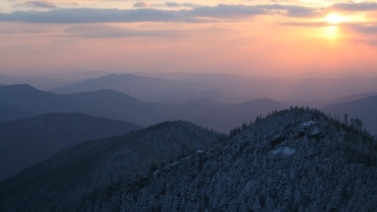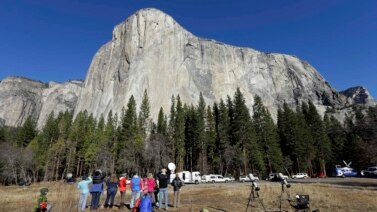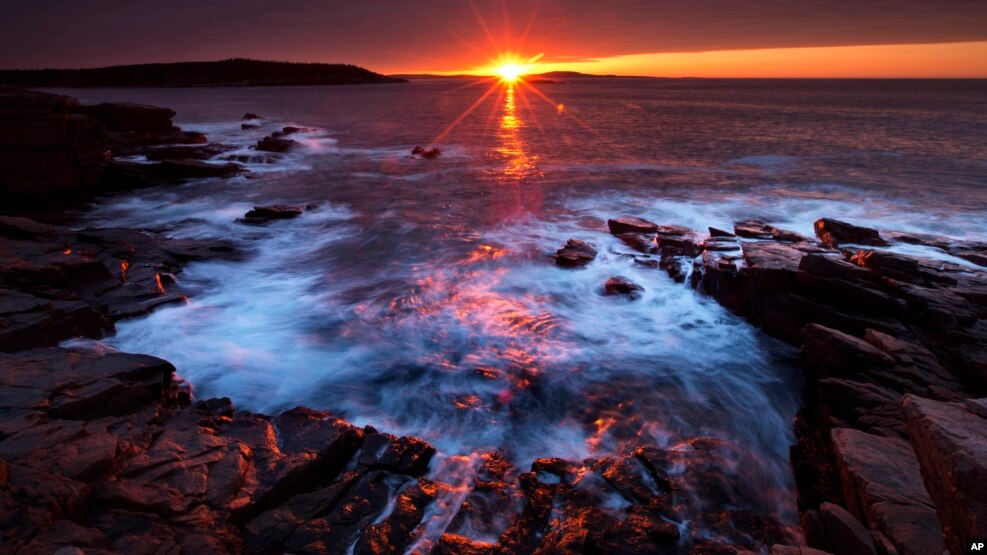
This week on our national parks journey, we are exploring the oldest national park east of the Mississippi River.
Much of the park sits on a rocky island off the coast of Maine called Mount Desert Island. Here, you will find the tallest mountain on the East Coast. You will also find black bears, moose, and more than 300 kinds of birds. This national park also holds unique Native American and European history.
It is called Acadia.
The 14,000-hectare park is one of the smaller major national parks in the country. Yet, Acadia sees almost 3 million visitors every year. They come to experience stunning views and take part in outdoor activities like hiking and biking, and swimming in the crisp blue Atlantic Ocean.
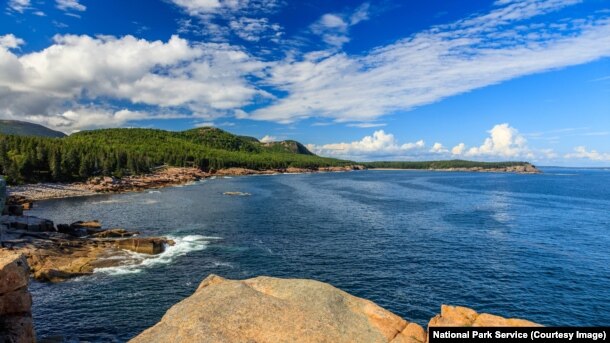
Acadia National Park has had many names throughout history. It was first declared a national monument in 1916. Its name, Sieur de Monts National Monument, was changed by Congress in 1919. It then became known as Lafayette National Park. In 1929, the park became Acadia National Park, from a past name for the area.
The name "Acadia" probably comes from "Arcadia," an area of Greece. It is said that an Italian explorer working for the King of France sailed by the area in 1524. The explorer thought that the landscape looked like the Greek area of Arcadia.
Mount Desert Island also got its name from early European explorers. Frenchman Samuel Champlain arrived on the island in 1604. He described the island's tall peaks as “bare and rocky.” He named the island, in French, “Isle des Monts Deserts,” or “island of desert mountains.”
Today, locals still say the word “desert” similar to its French pronunciation, duh-ZER.
Champlain and his team were not, of course, the first humans on the island. Native Americans were the first to inhabit the area. Shells and other archaeological evidence on the island date back more than 5,000 years.
The native Wabanaki people arrived there in boats made from the wood of birch trees. They hunted, fished, collected berries, and harvested clams from the sea. Wabanaki people called the island “Pemetic” or “sloping land.”
This “sloping land” is home to Cadillac Mountain. It is the highest point along America's eastern coast, at 466 meters. The island owes its landscape to ancient glaciers that once covered the area.
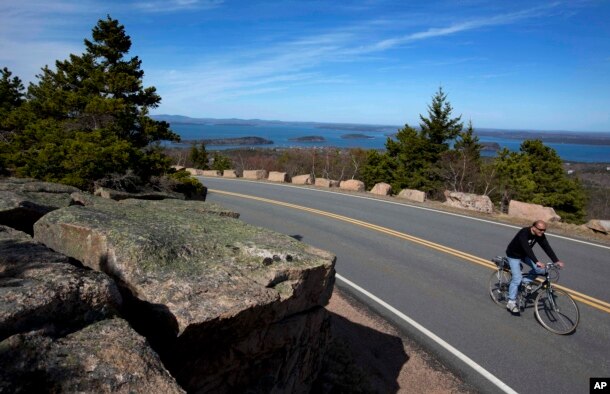
Cadillac Mountain is known as the first point in the U.S. that is touched by the rising sun each morning. The name of its early inhabitants, the Wabanaki, translates to “People of the Dawn.”
Today, the summit of Cadillac Mountain is often packed with visitors, many of whom arrive in cars and buses. It is one of the major tourist attractions within the park.
Many tourists also visit what may be the most photographed rock in the state. Bubble Rock is a giant boulder. It sits right on the edge of the summit of South Bubble Mountain. It was moved here by powerful ancient glaciers. Bubble Rock looks as though the slightest wind may push it over the mountain's edge. Visitors often take photos of themselves trying to push the huge rock off the mountain. Of course, Bubble Rock does not move.
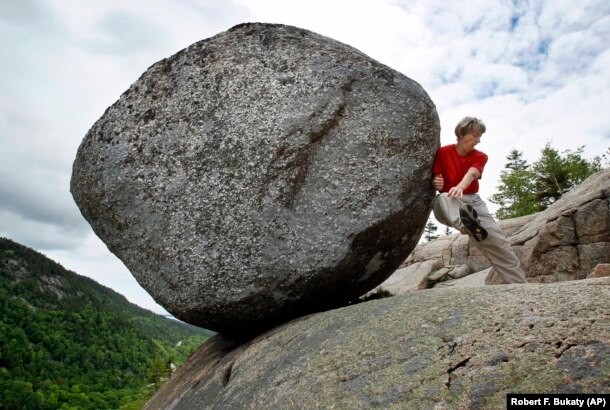
The Bubble Rock Trail winds up South Bubble Mountain. It is one of the most popular hiking trails in the park.
But, Acadia does offer solitude for visitors hoping to enjoy the quiet of nature. Within the park are more than 200 kilometers of trails. Many lead to stunning views of the rocky Maine coast. Some take you to pebbled beaches or quiet lakes surrounded by forest.
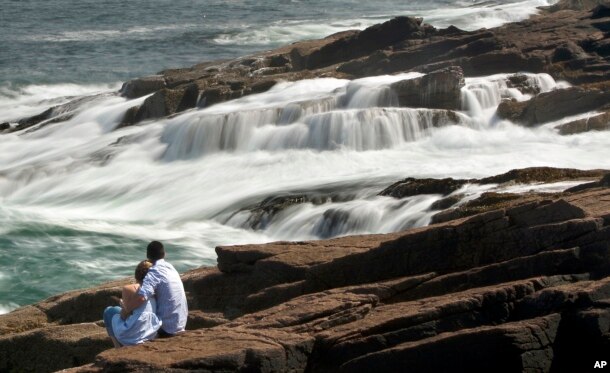
Many visitors to Acadia spend most of their time exploring Mount Desert Island.
But the Schoodic Peninsula is equally beautiful. The National Park Service now protects more than 1,300 hectares of land there. Last year, it gained about 500 additional hectares of land on the peninsula.
Schoodic offers secluded beaches and peaceful hiking trails. It also has a new campground maintained by the park.
In summer months, visitors can take a boat from the town of Bar Harbor on Mount Desert Island to the town of Winter Harbor on Schoodic Peninsula. The tiny fishing town is a great place to enjoy Maine lobster -- in many forms. A few small family-owned restaurants serve classic Maine dishes like lobster soup, lobster rolls, or simple steamed lobster.
But, wherever visitors explore in Acadia, they will leave wishing they could see more.
I'm Ashley Thompson.
And I'm Caty Weaver.
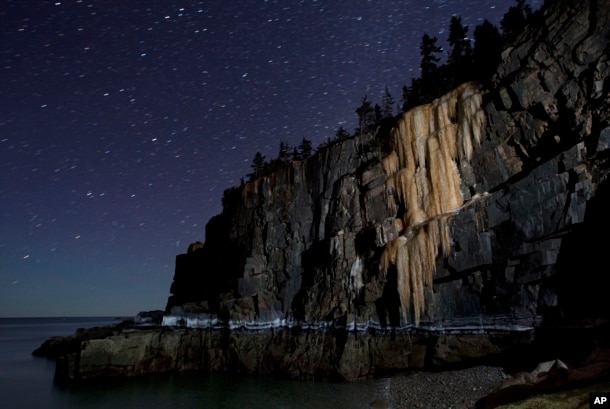
Words in This Story
unique - adj. very special or unusual
crisp - adj. pleasantly cool
bare - adj. not having a covering
inhabit - v. to live in (a place)
sloping - adj. leaning or slanting downward
pebble - n. a small, round stone
maintain - v. to keep (something) in good condition by making repairs and correcting problems

